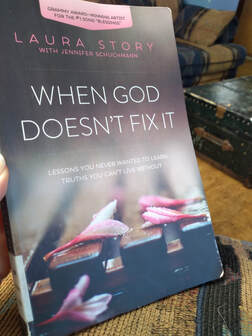
You know I've been writing my memoir.
... then putting it off, then making myself face it again; face the present, admit the past.
As I've tried to articulate the past, making sense of it, interpreting it, I've also been absorbing others' memoirs.
How do they make sense of their past? Of how it's shaped them?
And why is it helpful - or, better yet, critical - that I read it?
What I've Been Reading
I've read a number of memoirs recently, both to find myself in each one hopefully discovering the secret of how to be a human, and also to absorb the essence of excellent memoir writing so that I could deliver it to my readers, too.
... then putting it off, then making myself face it again; face the present, admit the past.
As I've tried to articulate the past, making sense of it, interpreting it, I've also been absorbing others' memoirs.
How do they make sense of their past? Of how it's shaped them?
And why is it helpful - or, better yet, critical - that I read it?
What I've Been Reading
I've read a number of memoirs recently, both to find myself in each one hopefully discovering the secret of how to be a human, and also to absorb the essence of excellent memoir writing so that I could deliver it to my readers, too.
The first memoir that accomplished this for me was When God Doesn't Fix It, by Laura Story. Hers was a story I'd hoped to find myself in. Her account of her perfect American middle class life being invaded suddenly by her husband's brain tumor was one I'd heard hadn't ended with resolution. They didn't get healing. The story of suffering continued.
It was this unfinished chaos I could relate to - the faithful pursuit of God, and even the tender comfort and powerful ministering of His heart to His hurting daughter even as the storm continued to rage; even as He did not lift his hand to still the waves.
This, I could relate to.
I raced through the pages, searching for an answer to my unasked questions - was I doing it right?
Was my continued struggle a punishment? Was it the limbo I must endure until I finally learned the lesson?
Or was it just stuff that happens and it was really, truly okay for meto not be okay?
Her struggle of faith in the fire was one that encouraged me greatly. In those pages, I met a sister in the furnace of sanctification, and was liberated. I found the permission I sought (why do I always need permission to exist?) - permission to suffer, experience pain, ask questions, and do so without condemnation or guilt, and do so instead with open hands that accept whatever the Lord gives as the path, even if that path goes through a blazing furnace and stops there for a long, hard while.
The book ends without resolution, bidding readers to continue to trust a good God even in the painful furnace, remembering that he does, ultimately control the temperature, and uses even such scorching heat to purify those he loves.
If you, like me, need to read someone's undone story, need to know that other people are unravelled by their circumstances too, and really need to know that it's okay to not be okay, I definitely recommend picking up this book.
What has encouraged you in your own furnace of suffering?
|
My memoir, is in the making!
Journey with me in a life-long search for Mom. For belonging. For home. While the unspoken strain of our family contorted me into a strange version of myself, there were also gifts along the way. They say you can choose your family, and I think they're right except for one thing; It's not as free and beautiful as it sounds. Choosing one family can mean the Unchoosing of another. |
Yes! I want sneak peeks!
Want to know when it's out, and get some cool insider glimpses along the way? Just tell me where to send them, and I will :)
|
